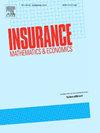As-if-Markov reserves for reserve-dependent payments
IF 2.2
2区 经济学
Q2 ECONOMICS
引用次数: 0
Abstract
In multistate life insurance, prospective reserves are commonly calculated as expectations conditioned only on the current state of the individual policy, rather than on the full observed past history, which is well motivated in Markov models, but is often done even when the empirical data does not show the Markov property. The resulting as-if-Markov prospective reserves then represent partially portfolio averaged values rather than individual values. This averaging effect is particularly relevant when individual policies are lapsed or modified, where it is common practice to credit the individual reserve to the policyholder, making the cashflow reserve-dependent. Such reserve dependence is normally avoided by applying the Cantelli theorem, but this does not work for as-if-Markov reserves without the Markov property. We show that, under mild technical assumptions, the as-if-Markov prospective reserves are still well defined despite the circularity in their definition, and we explain how they can be computed numerically by fixed-point iteration.
对依赖于储备的支付的似马尔可夫准备金
在多州人寿保险中,预期准备金通常被计算为仅以单个保单的当前状态为条件的预期,而不是以观察到的全部过去历史为条件,这在马尔可夫模型中是很好的动机,但即使经验数据不显示马尔可夫属性,也经常这样做。由此得出的似马尔可夫预期储量代表部分投资组合的平均值,而不是单个值。当个别保单失效或修改时,这种平均效应特别相关,通常的做法是将个人准备金记入保单持有人,使现金流依赖于准备金。这种储量依赖通常可以通过应用Cantelli定理来避免,但对于没有马尔可夫性质的似马尔可夫储量来说,这并不适用。我们表明,在温和的技术假设下,尽管其定义具有循环性,但似马尔可夫预期储量仍然定义良好,并且我们解释了如何通过定点迭代进行数值计算。
本文章由计算机程序翻译,如有差异,请以英文原文为准。
求助全文
约1分钟内获得全文
求助全文
来源期刊

Insurance Mathematics & Economics
管理科学-数学跨学科应用
CiteScore
3.40
自引率
15.80%
发文量
90
审稿时长
17.3 weeks
期刊介绍:
Insurance: Mathematics and Economics publishes leading research spanning all fields of actuarial science research. It appears six times per year and is the largest journal in actuarial science research around the world.
Insurance: Mathematics and Economics is an international academic journal that aims to strengthen the communication between individuals and groups who develop and apply research results in actuarial science. The journal feels a particular obligation to facilitate closer cooperation between those who conduct research in insurance mathematics and quantitative insurance economics, and practicing actuaries who are interested in the implementation of the results. To this purpose, Insurance: Mathematics and Economics publishes high-quality articles of broad international interest, concerned with either the theory of insurance mathematics and quantitative insurance economics or the inventive application of it, including empirical or experimental results. Articles that combine several of these aspects are particularly considered.
 求助内容:
求助内容: 应助结果提醒方式:
应助结果提醒方式:


